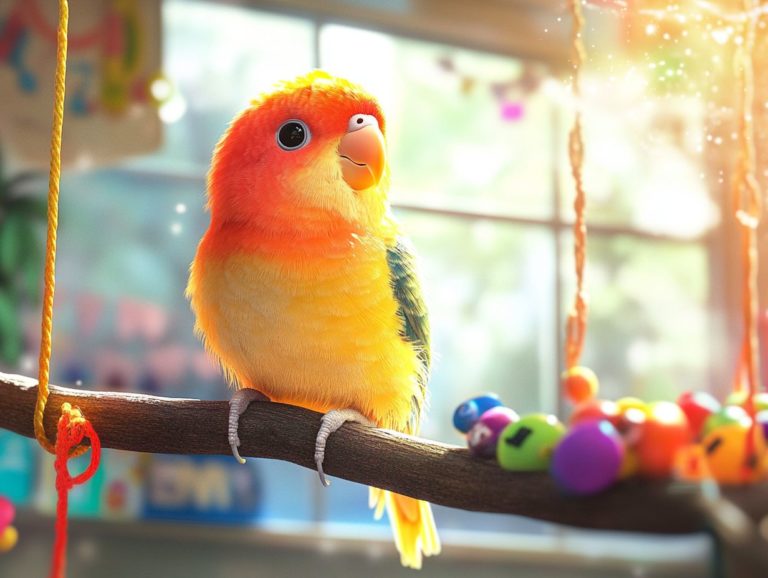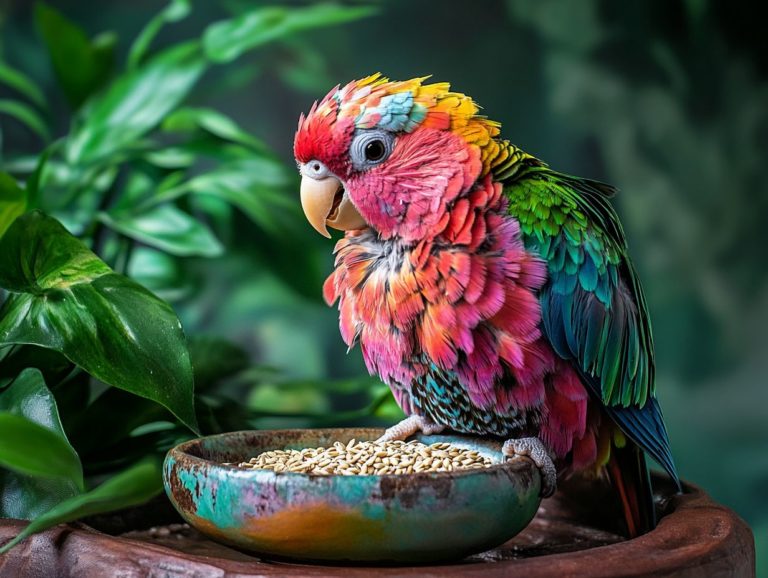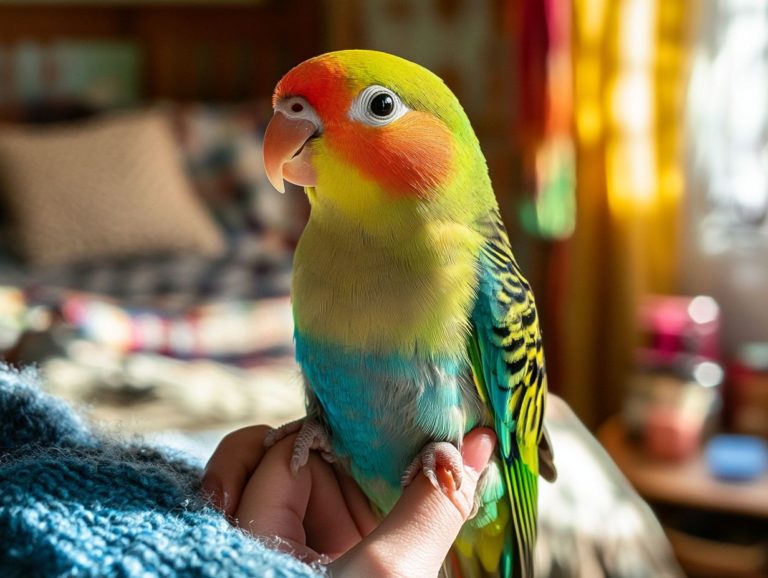How Often Should I Clean My Bird’s Cage?
Cleaning your bird’s cage is more than just looks; it s essential for your feathered companion’s overall health and happiness.
A tidy environment helps prevent unpleasant odors and harmful bacteria from accumulating, allowing your bird to thrive. How frequently should you clean? Consider factors such as the number of birds you have and their individual habits, as these will significantly influence your cleaning routine.
This article provides a cleaning schedule. It also covers effective techniques and solutions for common challenges. Your bird deserves a thriving home, so let s make it happen!
Contents
- Key Takeaways:
- Why Cleaning Your Bird’s Cage is Important
- Factors to Consider When Determining Cleaning Frequency
- Recommended Cleaning Schedule
- Proper Cleaning Techniques
- Troubleshooting Common Cleaning Issues
- Frequently Asked Questions
- How Often Should I Clean My Bird’s Cage?
- What Factors Should I Consider When Determining Cleaning Frequency?
- Can I Clean My Bird’s Cage Too Often?
- What Are the Benefits of Regularly Cleaning My Bird’s Cage?
- How Should I Clean My Bird’s Cage?
- Are There Any Signs That My Bird’s Cage Needs to Be Cleaned More Frequently?
Key Takeaways:
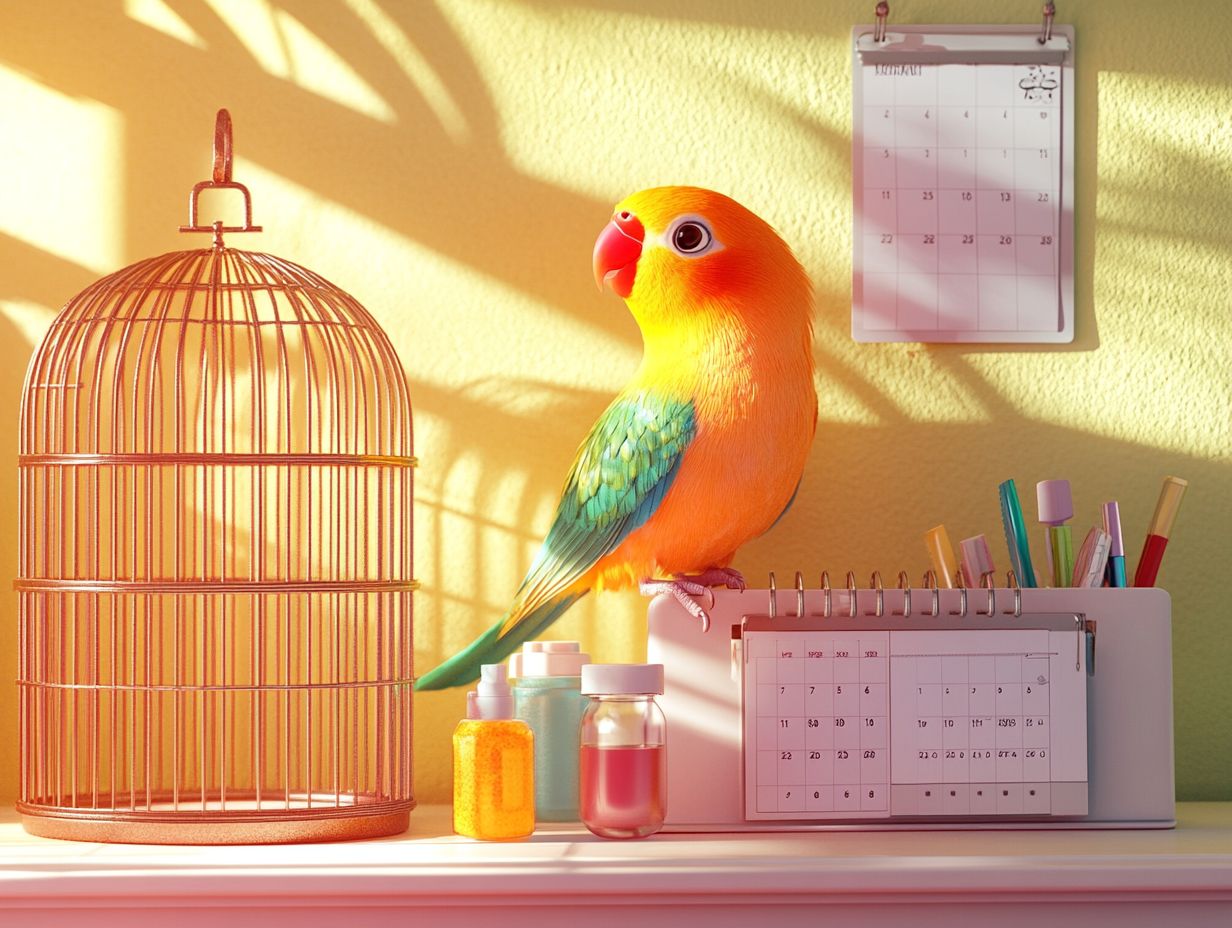
- Regular cleaning of your bird’s cage is important for maintaining their health and preventing foul odors and bacterial growth.
- The frequency of cleaning depends on the number of birds, cage size, and bird habits.
- A recommended cleaning schedule includes daily, weekly, and monthly tasks, with proper techniques and troubleshooting for common cleaning issues.
Why Cleaning Your Bird’s Cage is Important
Cleaning your bird’s cage is essential for safeguarding your pet’s overall health and well-being. A meticulously maintained cage environment can prevent health issues, alleviate stress, and establish a hygienic habitat for your feathered companion, using proper cleaning supplies and methods.
Regular cleaning is crucial to keep droppings, leftover food, and feathers under control. These elements can pose risks to your bird’s health. You can also inspect accessories, food dishes, and water bottles for potential hazards or contamination, ensuring a safe and nurturing living space for your pet bird.
Health Benefits for Your Bird
Maintaining a pristine cage environment is crucial for your pet bird’s health. It significantly reduces the risks of infectious diseases and allergic reactions.
Regular cleaning is not just about removing waste and uneaten food that could attract harmful bacteria. It also creates a fresh and inviting space that enhances your bird’s overall well-being. Using pet-safe disinfectants cleaning products that kill germs is essential for ensuring that the products you choose don’t threaten their sensitive respiratory systems.
When you prioritize cleanliness, you directly contribute to your bird s comfort and health. This allows it to flourish in a safe environment.
North Hampton Animal Hospital emphasizes the vital link between hygiene and avian health, reminding you that an immaculate living space nurtures a vibrant and happy life for your feathered companion.
Preventing Foul Odors and Bacterial Growth
Regular cleaning routines are vital for preventing unpleasant odors and the spread of harmful bacteria in your bird’s cage. These unwelcome smells often arise from leftover food, droppings, and moisture, creating a breeding ground for bacteria that can jeopardize your birds’ health.
By ensuring a clean environment, you keep your feathered companions comfortable and protect their well-being. It s essential to use pet-safe cleaning supplies; they effectively tackle stubborn stains and odors while safeguarding your bird’s respiratory health and maintaining overall cleanliness.
Adopting a systematic cleaning approach, including regular cage maintenance and freshening up perches, can greatly enhance the overall hygiene of their living space. This promotes a healthier lifestyle for your birds and cultivates a happier atmosphere for both you and your pets, ensuring their well-being.
Factors to Consider When Determining Cleaning Frequency
The frequency with which you clean your bird’s cage hinges on key factors. These include the number of birds in your care, the size of their living space, and the unique habits of your feathered friends. Additionally, understanding how often you should feed your bird can also influence their overall well-being and the cleanliness of their environment.
A small cage accommodating multiple birds will accumulate waste and feathers much more rapidly than a larger one housing just a single bird. This prompts the need for a more diligent cleaning schedule.
If your birds are particularly messy or have a penchant for playing with their food, they may require more frequent upkeep. By considering these elements, you can establish a customized cleaning routine that guarantees a safe and hygienic environment for your avian companions.
Number of Birds and Cage Size
The number of birds you own and the size of their cage significantly impact how often you should clean their living space. When multiple birds are housed together, their combined waste can accumulate rapidly, creating an environment that quickly becomes unpleasant and poses health risks.
It’s essential for bird owners like you to create a cleaning routine that keeps a clean living space, especially when caring for several feathered companions. The size of the cage is also important; larger cages may require more time for thorough cleaning, but they also provide easier access for maintenance.
Ultimately, the relationship between the number of birds and the dimensions of their cage dictates how frequently you clean and influences the overall efficiency of your upkeep process.
Types of Birds and Their Habits
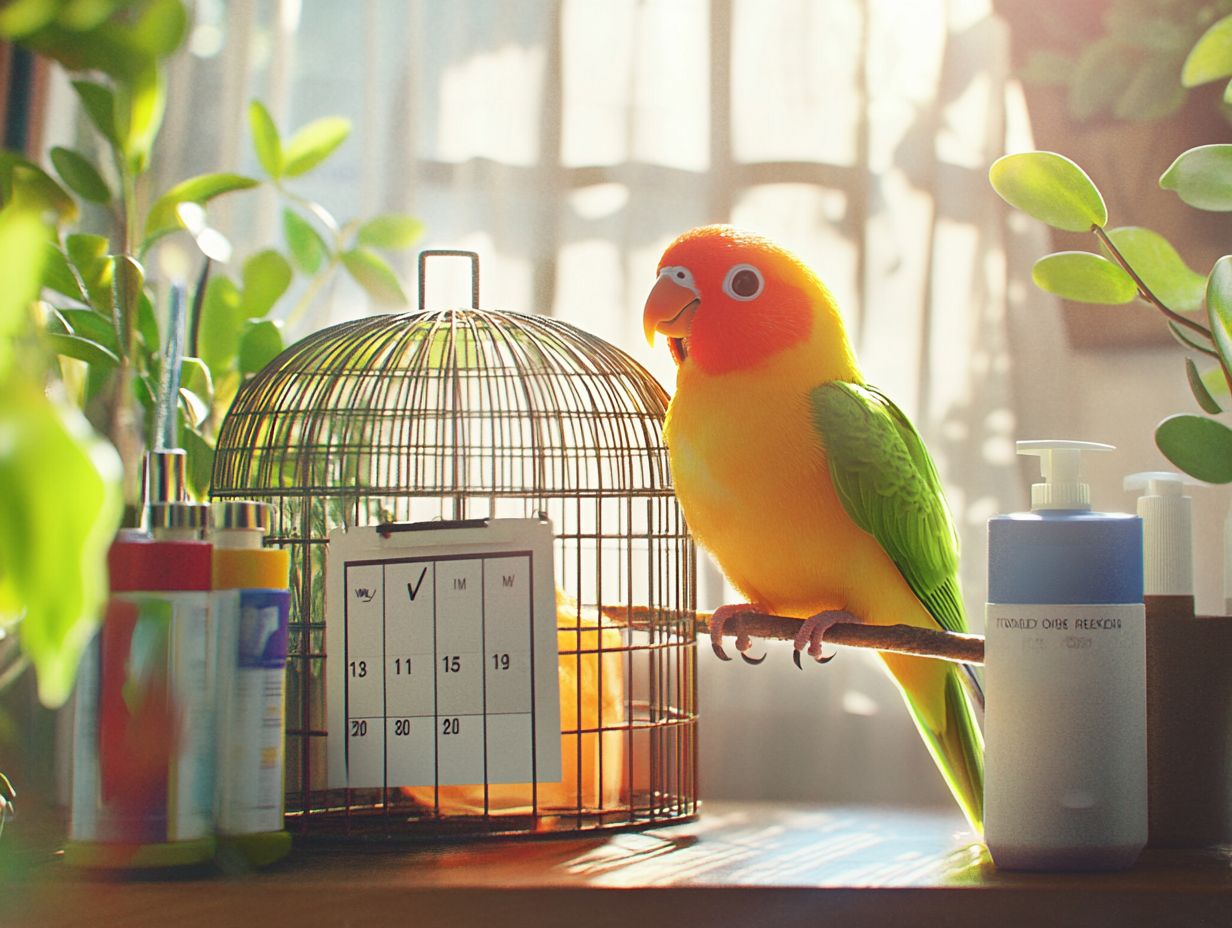
Different types of birds have unique habits that can significantly influence how often you need to clean their cages.
Take Eclectus parrots, for example. They are famous for their stunning plumage and charming personalities, but their dining habits can leave quite a mess, scattering seeds and pellets around their space. Amazon parrots, with their playful and exuberant nature, engage in spirited play that often results in shredded paper and scattered toys.
This mix of eating styles and playful antics determines the frequency of cleaning and requires distinct strategies for maintaining their habitats, such as using a birdbath for hygiene.
Understanding these nuances allows you to tailor your cleaning routines effectively, ensuring a happy and healthy living environment for your feathered friends while enhancing their care.
Recommended Cleaning Schedule
Establishing a recommended cleaning schedule can transform your bird’s cage into a pristine haven that fosters both health and happiness. By adopting a systematic approach dividing tasks into daily, weekly, and monthly routines you ll streamline maintenance, making it manageable and effective.
- Daily Tasks: Remove droppings, refresh food and water dishes, and ensure that the environment is clean.
- Weekly Tasks: Focus on deeper sanitization of accessories and a thorough wipe-down of the cage itself.
- Monthly Tasks: Replace liners and inspect all cage components for any signs of wear and tear.
By implementing this schedule, you ll not only avoid feeling overwhelmed but also ensure you re providing the best care and maintenance for your cherished feathered friend.
Daily Tasks
Daily tasks are crucial for maintaining a clean and safe environment for your bird, focusing on waste removal and refreshing their food and water supplies.
Regularly emptying and cleaning food dishes not only helps prevent bacterial growth but also ensures that your feathered friend has access to fresh, nutritious meals at all times, promoting their overall health. Cleaning water bottles is just as vital; stagnant water can quickly become a breeding ground for harmful pathogens.
Promptly removing droppings is essential for your bird s health! It minimizes the risk of infections and keeps the living space hygienic, significantly contributing to your bird’s overall health and happiness. By consistently addressing these routine chores, you can create an environment where your avian companion can flourish and thrive.
Weekly Tasks
Weekly cleaning tasks are essential, going beyond mere daily maintenance to provide a thorough sanitization of your bird’s cage and accessories. This deeper level of care is crucial for ensuring not only your bird’s immediate comfort but also its long-term health.
Engaging in routine activities like scrubbing the cage bars helps eliminate harmful bacteria that can accumulate over time, while cleaning toys ensures a safe play environment free from grime. Using a pet-safe disinfectant guarantees that all surfaces are clean and significantly reduces the risk of exposing your bird to toxic chemicals.
By committing to these essential cleaning rituals, you play a vital role in creating a hygienic habitat that supports your bird’s overall well-being and health.
Monthly Tasks
Monthly cleaning tasks are essential for maintaining your bird’s cage in peak condition. Consistently replacing liners and inspecting toys for signs of wear not only elevates your bird’s living environment. It also significantly contributes to its overall health and well-being. Don’t let bacteria build up! Regular cleaning is vital for your pet’s health.
A careful check of your cleaning supplies ensures that you have everything needed for a thorough deep clean. This includes hoses, microfiber cloths, and even newspaper. By dedicating time to these vital tasks, you can avoid the buildup of harmful bacteria and extend the lifespan of both toys and accessories. This effectively safeguards against long-term issues that could compromise your pet’s comfort and happiness.
Proper Cleaning Techniques
Proper cleaning techniques are essential for ensuring your bird’s cage is not just clean but also safe for your feathered friend. Utilizing the right tools and products can significantly enhance the effectiveness of your cleaning efforts. Must-have tools might include brushes, vacuum cleaners to tackle feathers and debris, and pet-safe cleaning solutions that effectively eliminate bacteria without posing risks to your bird.
This process requires careful attention, ensuring that all surfaces are thoroughly disinfected and devoid of hazardous chemicals. By establishing a well-executed cleaning routine, you create a hygienic living environment that promotes your pet bird’s well-being.
Tools and Products to Use
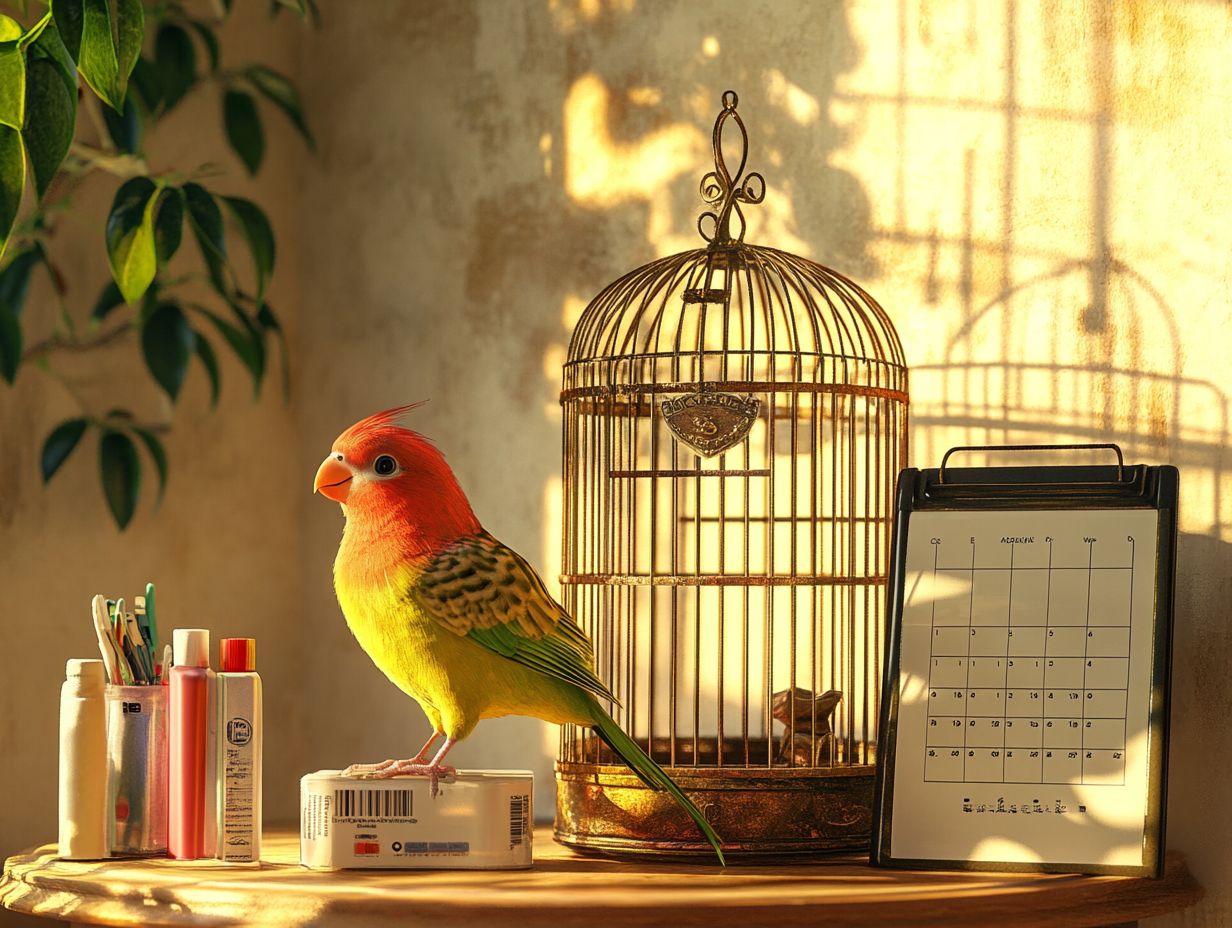
In terms of cleaning your bird’s cage, having the right tools and products is key to keeping your bird’s home clean and safe! Using effective cleaning tools like brushes, vacuums, and microfiber cloths can transform this task into a simpler and more efficient endeavor. Brushes are particularly adept at reaching into tight corners and crevices where dirt and residue tend to hide. Vacuums swiftly eliminate debris from the surrounding areas, ensuring everything stays tidy. Microfiber cloths are essential for trapping dust and leaving surfaces streak-free. Pair these with pet-safe cleaning solutions to create an environment free of harmful chemicals, safeguarding your feathered companion.
Together, these tools contribute to a cleaner habitat and enhance the overall well-being of your beloved pet.
Step-by-Step Cleaning Process
A step-by-step cleaning process ensures that you don t overlook any aspect of your bird’s cage, resulting in a thorough sanitization. This meticulous approach keeps the cage looking pristine and promotes the health and well-being of your feathered friend.
- Begin by removing all items from the cage dishes, perches, toys so you can clean each piece with a suitable pet-safe solution.
- Next, focus on the corners and crevices where debris often hides, utilizing a soft brush to tackle those hard-to-reach spots.
- Afterward, make sure to disinfect the cage frames and surfaces, adhering to the recommended time that the cleaning product needs to sit before rinsing.
Always keep in mind that a clean environment significantly reduces the risk of infections or illnesses. So take your time and scrutinize every detail during this process. Your bird deserves a spotless home, so let s dive in!
Troubleshooting Common Cleaning Issues
Encountering common cleaning issues is a certainty, but mastering the art of troubleshooting will ensure your bird’s cage remains in pristine condition and your cleaning routine runs smoothly.
Stubborn stains and lingering odors often stem from neglecting regular maintenance or opting for inadequate cleaning products. Understanding how to prevent escape attempts during cleaning reduces stress for both you and your feathered companion.
By equipping yourself to tackle these challenges, you’ll create a clean and safe haven for your beloved pet.
Dealing with Stubborn Stains and Odors
Stubborn stains and odors can be some of the most frustrating challenges in maintaining your bird’s cage. To tackle these issues effectively, utilize cleaning solutions specifically designed for bird habitats.
A blend of white vinegar and water works wonders for breaking down tough stains. Meanwhile, baking soda is excellent for neutralizing lingering odors. When using these methods, apply them with a soft cloth to remove grime safely without endangering your feathered friend.
Incorporating preventive measures, such as regular spot cleaning and using cage liners, minimizes the buildup of difficult stains and odors, creating a healthier environment for your birds.
Preventing Escape Attempts During Cleaning
Preventing escape attempts during cleaning is essential for your pet bird’s safety and the efficiency of your cleaning process. Cover any openings in the cage with suitable materials to block any potential escape routes.
Keep a close eye on your bird s behavior to gauge their comfort level. Creating a serene environment is equally important; consider playing soft music or speaking gently to reduce their stress.
Using safe and non-toxic cleaning supplies gives you peace of mind and makes cleaning easier.
Frequently Asked Questions
How Often Should I Clean My Bird’s Cage?
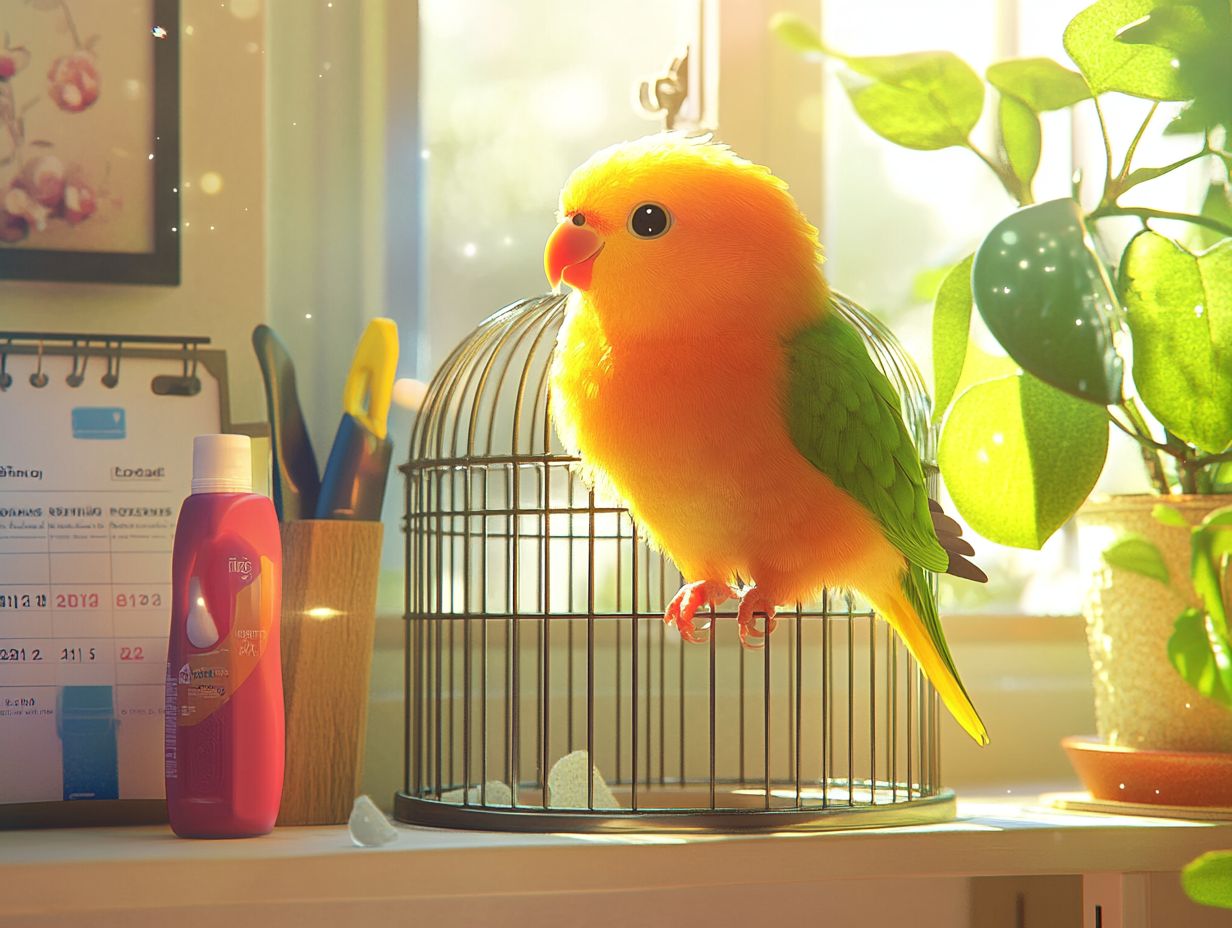
The general rule is to clean your bird’s cage at least once a week. However, the frequency may vary based on the size of your bird, the type of cage, and the number of birds living in it. For detailed instructions, check out this guide on how to maintain a clean bird cage.
What Factors Should I Consider When Determining Cleaning Frequency?
Consider the size and type of your bird, the number of birds in the cage, and the amount of debris and droppings produced. Additionally, think about the cage’s location and ventilation.
Can I Clean My Bird’s Cage Too Often?
Yes, cleaning too often can disrupt the natural bacteria and microorganisms that help maintain a healthy environment. Finding the right balance is key to keeping your bird happy and healthy!
What Are the Benefits of Regularly Cleaning My Bird’s Cage?
Regular cleaning prevents harmful bacteria and fungi buildup, which can lead to respiratory problems and other health issues. It also maintains a clean and hygienic environment for your bird.
How Should I Clean My Bird’s Cage?
Start by removing your bird and placing them in a safe location. Remove all toys, perches, and dishes from the cage and clean them separately. Use a bird-safe cleaner or a mixture of water and vinegar for the cage. Rinse thoroughly and dry it before placing everything back.
Are There Any Signs That My Bird’s Cage Needs to Be Cleaned More Frequently?
If you notice a strong odor, an increase in flies or insects around the cage, or a buildup of debris and droppings, it may be time to clean more frequently. Also, pay attention to your bird’s behavior and health as indicators.
Stay proactive! Regular cleaning keeps your feathered friend thriving!



